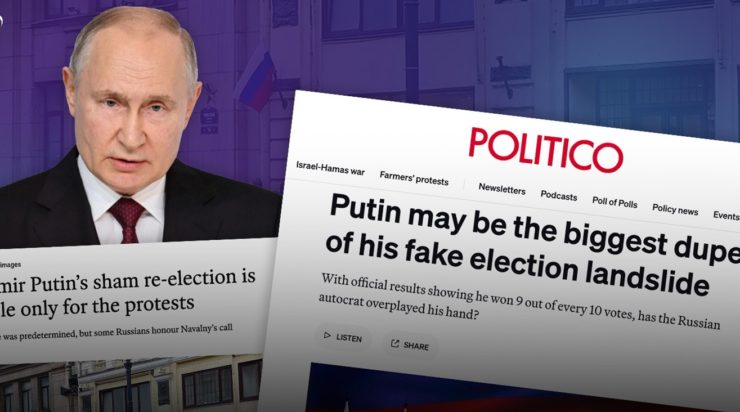
In the wake of Russia’s 2024 elections and President Vladimir Putin’s landslide victory, the collective West has condemned the outcome as “rigged,” “stage-managed,” a “rubber-stamp presidential election,” and “pre-determined.”
Headlines range from CNN’s, “Putin extends one man-rule in Russia after stage-managed election devoid of credible opposition,” which admitted President Putin amassed 87.3% of the vote, and Politico’s, “Putin ‘wins’ rigged Russian election with 87 percent of the vote,” to the New York Times’, “With New Six-Year Term, Putin Cements Hold on Russian Leadership,” which claims, “a rubber-stamp presidential election with no real competition allows Vladimir Putin to claim strong public support for his domestic dominance and the invasion of Ukraine.”
Omitted from all of these articles meant to portray Russian elections as a farce is the reality that Russian President Vladimir Putin is indeed an immensely popular, widely supported, and well-respected leader among the Russian public. This isn’t the conclusion of the Kremlin’s own polling, but instead conclusions drawn annually by the US government-funded polling organization, the Levada Center.
The Levada Center’s US government funding is provided via the National Endowment for Democracy (NED*), who would admit in a page on their official website titled, “Russia: Polling for Democracy, The Yuri Levada Analytical Center,” that:
The Yuri Levada Analytical Center, a NED* grantee based in Moscow, is an independent polling agency that is well-known for its surveys on sociopolitical issues both within Russia and worldwide.
According to the NED* grantee, the Levada Center, Russian President Putin’s approval rating as of February 2024 stands at 86%. This is higher than 2023 where President Putin’s approval rating was 85% and 83% in 2022.
Comparing the Levada Center’s 86% approval rating for 2024 with the recent electoral outcome, 87.3% of voters reelecting President Putin, it is clear the recent elections reflect the genuine sentiment of the Russian public as even US government-funded polling confirms. How is it then that the collective West, its governments and media, draw the conclusion that elections reflecting public sentiment are somehow “stage-managed,” “rigged,” or amount to a “rubber-stamp presidential election?”
Those making these claims never explain.
Instead, the collective West’s media claim that the exclusion of “opposition candidates” left President Putin with “no credible challenge to his rule,” as CNN claimed in its article. Such articles cite the late Alexei Navalny as “Putin’s fiercest opponent,” but had Navalny stood for elections, is there any reason to believe he would have won?
No.
The same US government-funded Levada Center has conducted numerous polls regarding the popularity (or lack thereof) of Alexei Navalny. As recently as 2023, the Levada Center determined only 9% of the Russian public “approve of Alexei Navalny’s activities,” while 57% did not, with another 23% not even knowing who Navalny is.
The Russian government did indeed jail Navalny, but not because he was a political threat to the current Russian administration. Instead, it was because he violated Russian law. Charges including those related to extremism are hardly “politically-motivated” as Navalny and his Western backers claimed. US diplomatic cables confirm at least one of Navalny’s opposition groups, “Democratic Alternative,” was funded by the US government through the NED*. A nation’s political independence is protected under international law via the UN Charter. A nation protecting itself against efforts by another nation to undermine that political independence is not “anti-democratic,” but done precisely to protect a nation’s own process of self-determination.
Ultimately, the collective West is attempting to undermine Russia’s electoral outcomes not because President Putin rigged the elections to pose as being popular when he isn’t, but precisely because the elections confirm President Putin is popular – as popular as even US government-funded polling has concluded.
And here lays bare the reality of the West’s self-appointed role as global arbiter of what is and isn’t “democratic” – democracy is a process of self-determination. Democracy in Russia means the Russian people, and the Russian people alone, determining their political future. Attempts by the US and Europe to interfere in this process isn’t “promoting freedom” as the US government’s NED*claims on its website, it is an attempt to usurp it.
The collective West doesn’t genuinely believe the Russian elections were unfair. Their own polling confirms that they were fair. The electoral outcome simply does not suit the collective West’s own interests, which include the political capture, destabilization, division, dissection, and exploitation of the Russian Federation. The louder the collective West complains about another nation’s internal political affairs, the more they implicate themselves in attempting to violate, not promote freedom, and undermine, rather than support democracy worldwide.
The best way, perhaps the only way to uphold freedom and democracy around the globe, is to expose and prevent foreign interference, not spend billions of dollars and decades carrying out such interference.
*- banned in Russia
Brian Berletic is a Bangkok-based geopolitical researcher and writer, especially for the online magazine “New Eastern Outlook”.